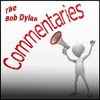Commentary
The relatively straightforward lyrics and smooth sound of Queen Jane Approximately add some contrast to the lyrically complex and up-tempo songs that precede it. There’s no need to think too hard about the lyrics, they are simple and direct.
But just because the lyrics are simple doesn’t mean they aren’t good. I particularly like the second verse:
Now when all of the flower ladies want back what they have lent you
And the smell of their roses does not remain
And all of your children start to resent you
Won’t you come see me, Queen Jane?
The song ends with a terrific line that defines the non-necessity of the spoken word between two true lovers: Come to me when you “want somebody you don’t have to speak to”.
Many Dylan commentators read Queen Jane as a love song. John Hinchey calls it one of “Dylan’s sweetest love songs”. Hum. I think whatever love there was between the couple is mostly a long time gone, replaced with a pointed bitterness. Although the narrator does seem to indicate that reconciliation is possible, it seems a pretty remote possibility. I certainly wouldn’t characterize it as a love song.
The song’s theme is similar to Like a Rolling Stone. Queen Jane, like most of the songs on the album, is another outsider song. In Rolling Stone the object of the narrator’s scorn is “Miss Lonely”, in this song it’s “Queen Jane”. Both characters are assailed for their adherence to traditional values of success and morality.
The identity of Queen Jane has been widely speculated on. As with many songs written during this period, it’s hard not to wonder if Jane could be Joan Baez. Baez was known as the Queen of Folk in the mid-sixties, and it’s hard not to notice that “Queen Jane” sounds a lot like “Queen Joan”. And of course, Dylan and Baez had quite the falling out not too long before the song was written.
For history buffs, the name Queen Jane brings to mind Queen Jane Grey, who was the queen of England for a total of nine days before she got her head chopped off with an ax at the tender age of sixteen. The lyrics indicate that Jane is heading for a fall, and I guess getting your head chopped off qualifies. Could Dylan have been comparing Grey’s fall with the character in the song? Could be, although it is a bit of a stretch. By the way, Joan Baez used to sing the traditional ballad, The Death of Queen Jane, which details thethe death of Queen Jane Seymour during childbirth.
I’ve often wondered whether Dylan gave any thought to replacing Queen Jane on the album with the similar but, in my opinion, superior Positively Fourth Street, which was released as a single before the album was issued. Perhaps he thought he didn’t need three songs accusing some anonymous “you” of various misdeeds on the same album and decided to toss out one of them. I like Queen Jane, but maybe he should have tossed it instead of Positively.
The only other official release that includes this song is 1989’s Dylan and the Dead. It’s not a terrible version. It’s one of the better takes on a bad album.
Dylan doesn’t play this Queen Jane a lot. A live version available from a 1989 concert in Berkeley, California is extremely well done. This performance occurred during the time when Saturday Night Live guitarist G.E. Smith was in the band. That band had its moments, but in general, was a bit too bombastic for its own good. On this night, however, they turn in a surprisingly tender and well-thought-out arrangement. Smith in particular shines, playing in a soft, chiming Bruce Langhorne-style that is very effective. Fans of this song should seek it out.
Queen Jane is a successful song, perhaps not at the same level as some of the other numbers on the album, but quite good in its own right. Stephen Scobie, in his book Alias Bob Dylan, quotes Allen Ginsberg: “I think Queen Jane is a great lyric poem, done as it is the blues style, an invitation to return to a relationship.”
Lyrics
When your mother sends back all your invitations
And your father to your sister he explains
That you’re tired of yourself and all of your creations
Won’t you come see me, Queen Jane?
Won’t you come see me, Queen Jane?
Now when all of the flower ladies want back what they have lent you
And the smell of their roses does not remain
And all of your children start to resent you
Won’t you come see me, Queen Jane?
Won’t you come see me, Queen Jane?
Now when all the clowns that you have commissioned
Have died in battle or in vain
And you’re sick of all this repetition
Won’t you come see me, Queen Jane?
Won’t you come see me, Queen Jane?
When all of your advisers heave their plastic
At your feet to convince you of your pain
Trying to prove that your conclusions should be more drastic
Won’t you come see me, Queen Jane?
Won’t you come see me, Queen Jane?
Now when all the bandits that you turned your other cheek to
All lay down their bandanas and complain
And you want somebody you don’t have to speak to
Won’t you come see me, Queen Jane?
Won’t you come see me, Queen Jane?

We are actively promoting a link to this interesting topic on The Bob Dylan Project at:
http://thebobdylanproject.com/Song/id/507
If you are interested, we are a portal to all the great information related to this topic.
Join us inside Bob Dylan Music Box.
might be the life and death of Queen Jane Seymour.
http://en.wikipedia.org/wiki/The_Death_of_Queen_Jane